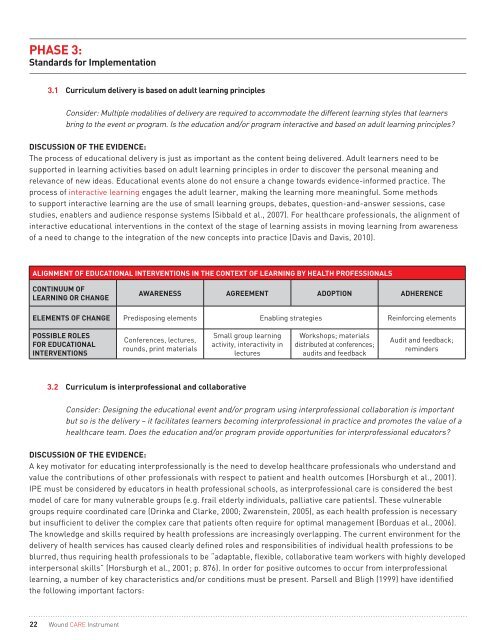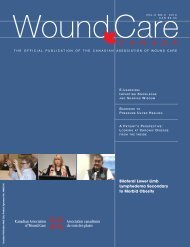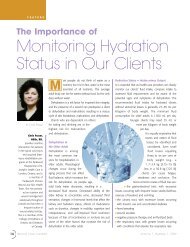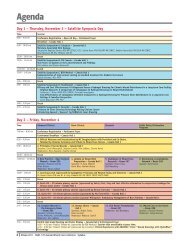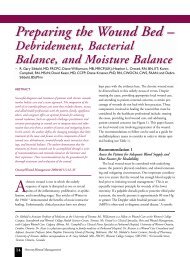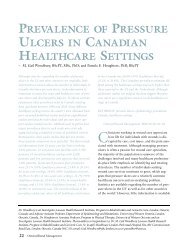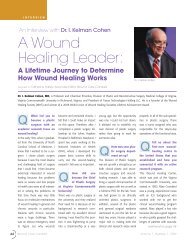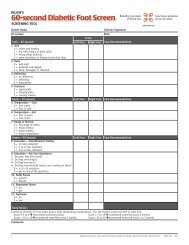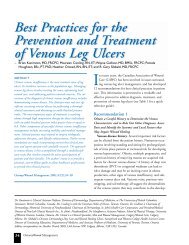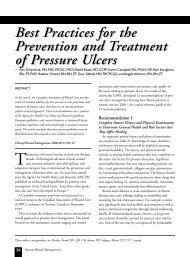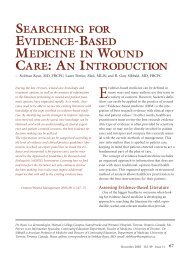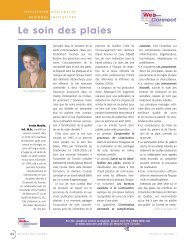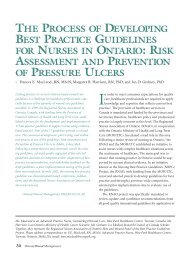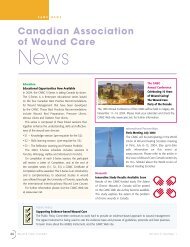Wound Care Instrument - Canadian Association of Wound Care
Wound Care Instrument - Canadian Association of Wound Care
Wound Care Instrument - Canadian Association of Wound Care
You also want an ePaper? Increase the reach of your titles
YUMPU automatically turns print PDFs into web optimized ePapers that Google loves.
phase 3:<br />
standards for implementation<br />
3.1 Curriculum delivery is based on adult learning principles<br />
Consider: Multiple modalities <strong>of</strong> delivery are required to accommodate the different learning styles that learners<br />
bring to the event or program. Is the education and/or program interactive and based on adult learning principles?<br />
DisCUssioN <strong>of</strong> the eviDeNCe:<br />
The process <strong>of</strong> educational delivery is just as important as the content being delivered. Adult learners need to be<br />
supported in learning activities based on adult learning principles in order to discover the personal meaning and<br />
relevance <strong>of</strong> new ideas. Educational events alone do not ensure a change towards evidence-informed practice. The<br />
process <strong>of</strong> interactive learning engages the adult learner, making the learning more meaningful. Some methods<br />
to support interactive learning are the use <strong>of</strong> small learning groups, debates, question-and-answer sessions, case<br />
studies, enablers and audience response systems (Sibbald et al., 2007). For healthcare pr<strong>of</strong>essionals, the alignment <strong>of</strong><br />
interactive educational interventions in the context <strong>of</strong> the stage <strong>of</strong> learning assists in moving learning from awareness<br />
<strong>of</strong> a need to change to the integration <strong>of</strong> the new concepts into practice (Davis and Davis, 2010).<br />
aligNmeNt <strong>of</strong> eDUCatioNal iNterveNtioNs iN the CoNtext <strong>of</strong> learNiNg by health pr<strong>of</strong>essioNals<br />
CoNtiNUUm <strong>of</strong><br />
learNiNg or ChaNge<br />
22 <strong>Wound</strong> CARE <strong>Instrument</strong><br />
aWareNess agreemeNt aDoptioN aDhereNCe<br />
elemeNts <strong>of</strong> ChaNge Predisposing elements Enabling strategies Reinforcing elements<br />
possible roles<br />
for eDUCatioNal<br />
iNterveNtioNs<br />
Conferences, lectures,<br />
rounds, print materials<br />
3.2 Curriculum is interpr<strong>of</strong>essional and collaborative<br />
Small group learning<br />
activity, interactivity in<br />
lectures<br />
Workshops; materials<br />
distributed at conferences;<br />
audits and feedback<br />
Audit and feedback;<br />
reminders<br />
Consider: Designing the educational event and/or program using interpr<strong>of</strong>essional collaboration is important<br />
but so is the delivery – it facilitates learners becoming interpr<strong>of</strong>essional in practice and promotes the value <strong>of</strong> a<br />
healthcare team. Does the education and/or program provide opportunities for interpr<strong>of</strong>essional educators?<br />
DisCUssioN <strong>of</strong> the eviDeNCe:<br />
A key motivator for educating interpr<strong>of</strong>essionally is the need to develop healthcare pr<strong>of</strong>essionals who understand and<br />
value the contributions <strong>of</strong> other pr<strong>of</strong>essionals with respect to patient and health outcomes (Horsburgh et al., 2001).<br />
IPE must be considered by educators in health pr<strong>of</strong>essional schools, as interpr<strong>of</strong>essional care is considered the best<br />
model <strong>of</strong> care for many vulnerable groups (e.g. frail elderly individuals, palliative care patients). These vulnerable<br />
groups require coordinated care (Drinka and Clarke, 2000; Zwarenstein, 2005), as each health pr<strong>of</strong>ession is necessary<br />
but insufficient to deliver the complex care that patients <strong>of</strong>ten require for optimal management (Borduas et al., 2006).<br />
The knowledge and skills required by health pr<strong>of</strong>essions are increasingly overlapping. The current environment for the<br />
delivery <strong>of</strong> health services has caused clearly defined roles and responsibilities <strong>of</strong> individual health pr<strong>of</strong>essions to be<br />
blurred, thus requiring health pr<strong>of</strong>essionals to be “adaptable, flexible, collaborative team workers with highly developed<br />
interpersonal skills” (Horsburgh et al., 2001; p. 876). In order for positive outcomes to occur from interpr<strong>of</strong>essional<br />
learning, a number <strong>of</strong> key characteristics and/or conditions must be present. Parsell and Bligh (1999) have identified<br />
the following important factors:


